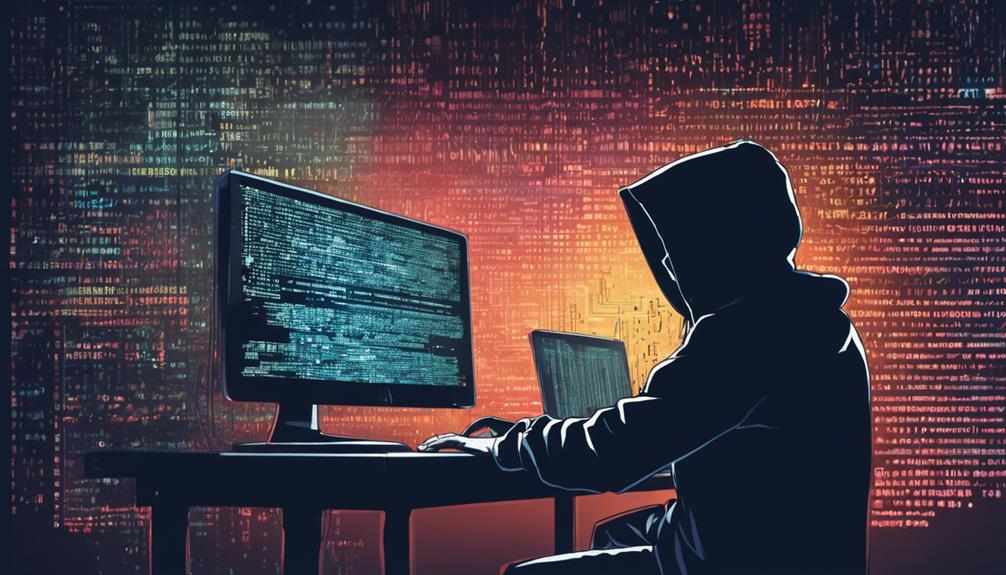Ethical hacking falls within legal boundaries when conducted with explicit permission and compliance with laws like the CFAA in the US or the GDPR in Europe. Frameworks such as the Budapest Convention and NIST SP 800-53 guide ethical hackers. Cases like Gary McKinnon's emphasize legal nuances in hacking. Understanding intent separates ethical hacking from cybercrime. Adherence to regulations and meticulous record-keeping are essential. Legal certifications, technical knowledge, and permission protocols are crucial for ethical hackers. Importance lies in proactive cybersecurity defense enhancement. Continuing exploration reveals more on legal intricacies and ethical hacking distinctions.
Key Takeaways
- Ethical hacking is legal when conducted with explicit permission.
- Compliance with legal frameworks like the CFAA and GDPR is crucial.
- Unauthorized hacking is illegal and constitutes cybercrime.
- Ethical hackers aim to enhance cybersecurity with authorized testing.
- Understanding intent and consent is essential for legal distinctions.
Legal Landscape of Ethical Hacking
Ethical hacking operates within a meticulously defined legal framework to guarantee compliance with established regulations and standards. Laws such as the Computer Fraud and Abuse Act (CFAA) in the United States, along with the General Data Protection Regulation (GDPR) in Europe, set the boundaries for ethical hacking practices. These legal frameworks outline what actions are permissible for ethical hackers, emphasizing the importance of obtaining explicit permission before conducting any security assessments.
Moreover, international standards like the Budapest Convention are also considered by countries like Belgium when regulating ethical hacking activities. NIST Special Publication 800-53 provides detailed security controls and guidelines that ethical hackers must adhere to during their operations. Additionally, thorough record-keeping of all actions taken is essential to demonstrate compliance with legal requirements.
Understanding the legal implications of ethical hacking and seeking legal advice when necessary are important steps in ensuring that ethical hackers operate within the confines of the law while effectively enhancing cybersecurity measures.
Case Studies in Ethical Hacking

Examining real-world instances of hacking activities sheds light on the practical applications and legal implications of cybersecurity practices. Several case studies illustrate the diverse outcomes of ethical hacking endeavors.
| Case Studies | Ethical Hacking | Computer Fraud and Abuse Act (CFAA) |
|---|---|---|
| Gary McKinnon | Uncovered NASA and Pentagon systems' security flaws | Charged under the CFAA for unauthorized access |
| Andrew Auernheimer | Exposed AT&T's security vulnerability | Convicted under the CFAA for data breach |
| William Brown | Disclosed DNS protocol flaw to prevent internet takeover | Demonstrated responsible ethical behavior |
These cases highlight the blurred lines between ethical hacking and cybercrime. While some hackers like William Brown contribute to enhancing cybersecurity, others like Gary McKinnon face legal repercussions for unauthorized access. The Computer Fraud and Abuse Act (CFAA) plays a significant role in determining the legality of hacking activities, underscoring the importance of understanding and adhering to relevant laws in the field of cybersecurity.
Boundary Between Ethical Hacking & Cyber Crime

Ethical hacking is a practice aimed at enhancing cybersecurity through authorized testing and vulnerability assessments. Understanding the distinctions between ethical hacking and cybercrime is essential, as the former is conducted with permission and the intent to bolster defenses, while the latter involves illegal activities for personal gain or harm.
Ethical Hacking Explained
When delving into the domain of hacking practices, it is essential to discern the fine line separating legitimate security testing from unlawful cyber activities. Certified Ethical Hackers, also known as Penetration Testers, are individuals authorized to assess systems for security vulnerabilities. Their role is to identify weaknesses in a network or software to help organizations strengthen their defenses. Ethical hackers operate under strict guidelines and seek explicit permission before conducting any tests.
In contrast, cybercrime involves unauthorized access to systems with malicious intent, often for personal gain or to cause harm. The distinction between ethical hacking and cybercrime lies in the intent and authorization behind the actions taken. Ethical hackers aim to improve security measures and protect against potential threats, while cybercriminals engage in illegal and destructive activities that violate privacy and integrity.
Understanding this boundary is pivotal for maintaining legal and ethical standards in cybersecurity practices and ensuring the integrity of digital systems.
Legal Aspects Clarified
A clear understanding of the legal distinctions between ethical hacking and cyber crime is essential in maneuvering the complexities of cybersecurity practices. Ethical hacking involves obtaining explicit permission to test systems for vulnerabilities within legal boundaries, aiming to improve security.
On the contrary, cyber crime entails unauthorized hacking for malicious purposes, leading to legal repercussions due to its intent to cause harm or gain personal benefit. The legal implications of hacking activities are contingent on consent, with ethical hacking aligning with laws such as the Computer Fraud and Abuse Act (CFAA) and the General Data Protection Regulation (GDPR).
It is important to comprehend the legal boundaries to make sure that ethical hacking practices comply with regulations and do not encroach upon cyber crime territory. By adhering to these distinctions, cybersecurity professionals can navigate the fine line between ethical hacking and illegal cyber activities, contributing to a safer digital environment.
Cybercrime Distinctions
Understanding the distinction between ethical hacking and cyber crime is essential in maneuvering the legal landscape of cybersecurity practices. Ethical hacking, conducted with proper authorization, aims to identify system weaknesses for defensive purposes.
On the other hand, cybercrime involves unauthorized and malicious hacking activities with intentions of personal gain or harm. The Computer Fraud and Abuse Act (CFAA) is a key legal framework that helps differentiate between these practices, outlining what constitutes legal and illegal behavior in the digital domain.
Here are key points to keep in mind when distinguishing between ethical hacking and cybercrime:
- Ethical hacking requires permission and aims to enhance system security.
- Black hat hackers engage in cybercrime for personal gain or to cause harm.
- The CFAA establishes boundaries for permissible and impermissible hacking activities.
- Adherence to ethical standards and legal regulations is essential for ethical hackers to avoid legal repercussions.
Staying Lawful as an Ethical Hacker

To guarantee lawful conduct as an ethical hacker, it is essential to obtain explicit permission from system owners before engaging in any hacking activities.
Adherence to legal frameworks such as the Computer Fraud and Abuse Act (CFAA) and General Data Protection Regulation (GDPR) is vital to operate within ethical boundaries.
Keeping meticulous records of permissions and activities, seeking appropriate training and certifications, and abiding by ethical codes are essential practices for ethical hackers to maintain legality in their operations.
Ethical Hacking Guidelines
Ethical hacking guidelines highlight the significance of obtaining explicit permission from system owners before conducting security tests to guarantee lawful practices in the field. Following these guidelines promotes a responsible and legal approach to ethical hacking.
Some key principles to adhere to include:
- Permission: Always seek permission from the system owner before attempting any security tests to guarantee legality and ethicality.
- Compliance: Adhere to legal frameworks such as the Computer Fraud and Abuse Act (CFAA) and the General Data Protection Regulation (GDPR) to operate within ethical boundaries.
- Documentation: Maintain detailed records of all activities and permissions granted to demonstrate a transparent and accountable ethical hacking process.
- Training and Certification: Obtain proper training, certification, and adhere to ethical codes of conduct to uphold professional standards in ethical hacking practices.
Legal Boundaries for Hackers
Operating within legal boundaries as an ethical hacker requires strict adherence to established laws and regulations governing cybersecurity practices. Ethical hackers must familiarize themselves with key legislation such as the Computer Fraud and Abuse Act (CFAA) to guarantee their activities remain lawful. The CFAA prohibits unauthorized access to computer systems, emphasizing the importance of obtaining explicit permission before conducting any security testing.
Security experts recommend that ethical hackers maintain detailed records documenting authorization from system owners and the specific actions taken during their assessments. This documentation serves as vital evidence to demonstrate compliance with legal requirements and protect ethical hackers from potential legal repercussions.
Furthermore, ethical hackers should stay informed about evolving cybersecurity laws, such as the General Data Protection Regulation (GDPR), to uphold ethical standards and avoid legal pitfalls. Seeking legal advice when in doubt and regularly updating knowledge about cybersecurity regulations are essential practices for ethical hackers to navigate the complex legal landscape successfully.
Legal Frameworks for Ethical Hacking

Within the domain of ethical hacking, understanding the legal frameworks is paramount to guaranteeing compliance and legitimacy in cybersecurity practices. Adhering to laws and regulations, such as the Computer Fraud and Abuse Act (CFAA) in the US and the General Data Protection Regulation (GDPR) in Europe, is essential for conducting ethical hacking activities within legal boundaries.
To navigate the legal landscape effectively, ethical hackers must consider the following:
- Explicit Permission: Obtaining explicit permission from system owners is a foundational requirement for ethical hacking to remain lawful.
- CFAA Compliance: Adhering to the guidelines outlined in the CFAA is vital to ensure that ethical hacking practices meet legal standards.
- Information Security Laws: Understanding and following legal regulations governing information security is fundamental for ethical hacking to operate ethically.
- Global Data Protection Regulations: In a global context, being aware of data protection laws, such as the GDPR, is crucial for ethical hacking practices that involve international systems.
Distinguishing Ethical Hacking From Cybercrime

Ethical hacking, also known as white-hat hacking, operates within legal frameworks, contrasting sharply with cybercrime.
While both activities involve penetrating systems, the significant distinction lies in the intentions and permissions granted.
White-hat hackers are authorized professionals aiming to fortify cybersecurity defenses, while cybercriminals engage in unauthorized activities for personal gain.
Legal Ethical Hacking
Distinguishing legal ethical hacking from cybercrime involves a clear focus on permissions and intentions. Ethical hackers play an important role in enhancing system security by following strict guidelines and legal frameworks.
Here are some key points that differentiate legal ethical hacking from cybercrime:
- Critical Role: Ethical hackers play a vital role in enhancing system security by following strict guidelines and legal frameworks.
- Compliance with Laws: Ethical hackers adhere to regulations like the Computer Fraud and Abuse Act (CFAA) and the General Data Protection Regulation (GDPR) to ensure that their activities are within legal boundaries.
- Intentions: Ethical hacking aims to identify vulnerabilities and enhance defenses without causing harm to the system or its users.
- Focus on Security: The primary goal of ethical hacking is to strengthen security measures, protect against potential threats, and prevent malicious activities.
Cybercrime Versus White-Hat
In the domain of cybersecurity, the contrast between cybercrime and white-hat hacking lies in the intentions and methods employed by individuals engaging in these activities. White-hat hackers, also known as ethical hackers, play an important role in enhancing cyber security by proactively identifying and rectifying vulnerabilities within systems with proper authorization. This stands in stark contrast to cybercriminals who exploit these weaknesses for malicious purposes, often violating laws such as the Computer Fraud and Abuse Act.
White-hat hackers operate within legal boundaries, focusing on improving organizational security defenses and preventing potential cyber threats. Their actions are sanctioned and aim to bolster cybersecurity measures.
On the other hand, cybercrime involves unauthorized access, leading to financial losses, reputational damage, and legal repercussions for the perpetrators. Understanding the distinction between these two practices is essential for upholding legal compliance and ethical behavior in the realm of cybersecurity, ultimately safeguarding digital environments from malicious activities.
Steps for Law-Abiding Ethical Hackers

Law-abiding ethical hackers make sure to obtain explicit permission before engaging in any hacking activities. To guarantee that their actions remain within legal boundaries and uphold ethical standards, these hackers follow specific steps:
- Obtain Permission: Before initiating any hacking attempt, ethical hackers seek authorization from the relevant parties to conduct their assessments lawfully.
- Maintain Detailed Records: Keeping thorough documentation of the scope and purpose of each hacking endeavor helps in demonstrating transparency and accountability for their actions.
- Adhere to Legal Frameworks: Compliance with regulations such as the Computer Fraud and Abuse Act (CFAA) and the General Data Protection Regulation (GDPR) is essential for ethical hacking within legal boundaries.
- Continuous Education and Ethical Codes: Seeking appropriate training, obtaining relevant certifications, and adhering to ethical codes of conduct are vital for law-abiding ethical hackers to stay current with industry standards and best practices.
Perspectives on Hacking Legality

When examining the legality of hacking, it is essential to take into account the diverse perspectives that shape this complex issue. Ethical hacking, aimed at enhancing security, is distinct from the activities of malicious hackers due to the intentions and permissions involved.
Ethical hacking operates within legal frameworks such as the Computer Fraud and Abuse Act (CFAA) in the United States, which prohibits unauthorized access to computer systems. This legislation highlights the importance of obtaining explicit permission before conducting any form of hacking, even if it is intended to improve cybersecurity defenses.
While ethical hacking is often viewed as a positive force in strengthening digital security, the line between ethical and malicious hacking can sometimes blur. This ambiguity underscores the necessity for clear ethical guidelines and legal boundaries in the domain of cybersecurity.
Understanding these perspectives sheds light on the intricate nature of hacking legality and the critical role that regulations like the CFAA play in shaping ethical conduct in the digital domain.
Ethical Hacking Concepts & Examples

Understanding the fundamental concepts and practical examples of ethical hacking is vital for successfully managing the complexities of cybersecurity and ensuring the legal and ethical integrity of security testing processes.
Ethical hacking involves obtaining explicit permission to test and improve security measures. Examples of ethical hacking include penetration testing, vulnerability assessments, and social engineering tests. Ethical hackers aim to identify and prevent security vulnerabilities before malicious hackers exploit them.
The goal of ethical hacking is to strengthen cybersecurity defenses and protect sensitive data legally. By actively engaging in ethical hacking practices, organizations can proactively address security risks and comply with legal regulations.
Ethical hacking plays a significant role in enhancing cybersecurity measures, as it allows experts to simulate real-world cyber threats and vulnerabilities to improve overall defenses. This proactive approach helps in identifying weaknesses before they can be exploited by malicious actors, ultimately leading to a more robust and secure digital environment.
Requirements for Ethical Hackers

Basic qualifications and certifications are essential for individuals aspiring to become ethical hackers in the cybersecurity field. Ethical hackers typically hold certifications like Certified Ethical Hacker (CEH) from EC-Council, demonstrating their expertise in identifying and addressing security weaknesses.
In addition to certifications, skills required for ethical hackers include knowledge of computer systems, coding languages, cryptography, and network security. A bachelor's degree in a related field and experience in cybersecurity are commonly required for ethical hacking roles to guarantee a strong foundation in the field.
Other certifications such as CompTIA Security+, CCNA Security, PEN-200, and GIAC further enhance the credentials of ethical hackers, showcasing their commitment to continuous learning and skill development. Ethical hackers must also be well-versed in the legal aspects of hacking, ensuring compliance with regulations like the Computer Fraud and Abuse Act (CFAA) while utilizing techniques like social engineering to test systems ethically and enhance cybersecurity measures.
Frequently Asked Questions
Are Ethical Hackers Legal?
Ethical hackers, when operating within legal boundaries, are legal. Their sanctioned activities, carried out with explicit permission, focus on enhancing cybersecurity defenses. Aligned with laws like the CFAA and GDPR, ethical hacking guarantees compliance and ethical conduct.
What Is the Legal Risk of Ethical Hacking?
Engaging in ethical hacking presents potential legal risks contingent upon adherence to permissions. Violations of boundaries can result in legal consequences. Compliance with regulations like the CFAA and GDPR, coupled with meticulous documentation, safeguards against liabilities.
Which Hackers Are Considered Legal?
Hackers considered legal are white hat hackers. They operate ethically, with permission, to enhance cybersecurity. White hat hackers focus on identifying vulnerabilities, providing solutions, and strengthening defenses against cyber threats. Their actions are legitimate and valuable.
What Is the Difference Between Ethical and Illegal Hacking?
Ethical hacking, akin to a guardian of the digital domain, involves authorized probing for vulnerabilities to fortify defenses. Illegal hacking, a shadowy intruder, breaches systems without consent, inflicting harm and breaching ethical norms.
Conclusion
To sum up, ethical hacking walks a fine line between legality and illegality, with the key factor being the intention behind the actions taken.
While the field offers opportunities for cybersecurity professionals to test and enhance security measures, it is important to adhere to legal frameworks and guidelines to guarantee that ethical hacking remains a valuable and lawful practice in the digital age.









